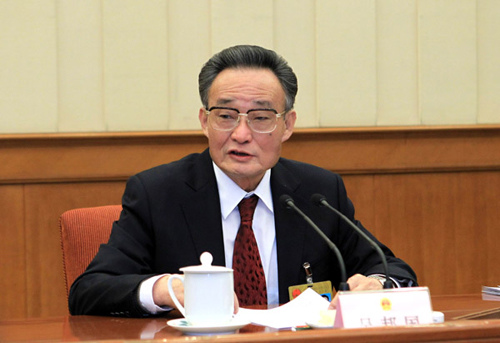
Wu Bangguo, chairman of the Standing Committee of China's National People's Congress (NPC), presides over a plenary meeting of the 24th session of the 11th NPC Standing Committee in Beijing, capital o
The National People's Congress (NPC) Standing Committee, China's top legislature, began Monday its bimonthly session to deliberate an expository bill of the Macao Basic Law and other draft laws and amendments.
A total of 152 members of the NPC Standing Committee attended the session, which was presided over by Wu Bangguo, chairman of the NPC Standing Committee.
The lawmakers deliberated draft interpretations on two annexes to the Basic Law of the Macao Special Administrative Region (SAR) regarding the method for the selection of the SAR chief executive and the method for the formation of the SAR Legislative Council.
The lawmakers believe that it is "proper and necessary" to adopt the draft during the session this week as it would help safeguard Macao's long-term prosperity and stability.
The draft amendment to the Law on Occupational Illness Prevention and Control, which undergoes its third reading at the session, stipulates that local governments can arrange patients to get treatment if their former employers no longer exist or the claimed original work relations cannot be ascertained.
The draft also said that the worker's union must be consulted when an employer is working out or amending its own system with regard to occupational illness prevention and control.
The draft amendment to the Criminal Procedural Law stipulates that prosecutors and police are allowed to check and freeze criminal suspects' bonds, shares and funds.
The draft amendment, submitted for its second reading, also stipulates that protective measures should be taken to ensure the safety of appraisers.
The draft amendment excludes criminal cases involving foreign criminal suspects from the category in which the first trial must be heard by intermediate courts, given that the trial capabilities of local courts have been enhanced.
The draft amendment also adds a new clause to allow those who suffer from serious diseases, or are unable to care for themselves, pregnant or caring for infants, to be released on bail.
Legislators also started Monday deliberating a draft amendment to the Budget Law and two draft laws, including one on the management of the exit and entry of personnel and another on insurance for service members.
The draft law on exit and entry administration makes stipulations mainly on the exit and entry of Chinese and foreign nationals, the stay and employment of foreigners in China, and punishment for violations.
A foreigner shall get work permits and residence certificates for employment before being employed, according to the draft law.
Foreigners who work illegally in China will be fined between 5,000 yuan (792 U.S. dollars) and 20,000 yuan, and may be detained from five to 15 days for serious violations.
Those who illegally provide job placement services for foreigners or illegally employ foreigners would also be fined.
The draft law on insurance for service members said that it will provide insurances covering deaths, injuries and illnesses during enlistment, as well as medical insurances and pensions for veterans.
According to the draft, the state will provide subsidies for veterans' pensions and medical insurances.
Moreover, the draft states the insurance system will also cover pensions and medical insurances of military spouses living with the service members at military duty stations.
The lawmakers also reviewed a bill proposed by the State Council, or the cabinet, to ratify two treaties between the Chinese and Italian governments regarding extradition and mutual judicial assistance in criminal cases.
The extradition treaty covers issues such as extradition obligations, extradition offenses, reasons that can and should be used to refuse extradition, rules on property transfer and the settlement of disputes.
A China-Russia accord on cooperation for fighting terrorism, separatism and extremism was also discussed.
Lawmakers also reviewed a draft decision on when to hold the annual NPC session in 2012, a report on the qualifications of certain NPC delegates, and certain appointments and dismissals.

Copyright ©1999-2011 Chinanews.com. All rights reserved.
Reproduction in whole or in part without permission is prohibited.